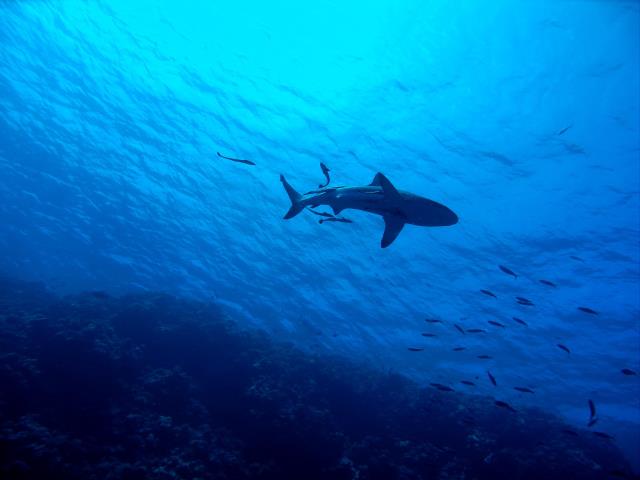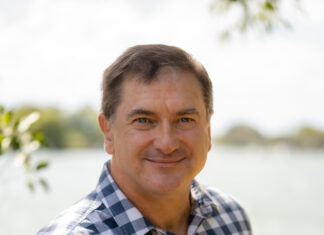Noosa Council is moving toward a policy on the Department of Agriculture and Fisheries (DAF) Shark Control Program (SCP), specifically in relation to the use of nets and drumlines adjacent to Noosa beaches, in response to a motion put forward last month by Councillor Amelia Lorentson.
From a report prepared for Council’s general meeting on Monday Council officers said to date Council has not held a policy on the Shark Control Program and
therefore was unable to provide guidance to the general community on the matter.
However Council and the Noosa Biosphere Reserve Foundation (NBRF) had actively supported DAF in the delivery of SharkSmart programs, while Surf Lifesaving Queensland (Noosa) has supported the trials of alternative shark bite mitigations (drones) under the Queensland Shark Management Plan (2021–2025).
Local Governments play only a minor role in the delivery of the Queensland Shark Management Plan, primarily through providing assistance in the delivery of SharkSmart community awareness programs as requested by DAF, the report stated.
The willingness of Council to further assist the role out of SharkSmart programs, or where appropriate, alternative shark bite mitigation trials was discussed at a recent workshop held between Noosa councillors and DAF Shark Control Program staff.
Under a staff-recommended policy position Council would continue to support the DAF Shark Control Program (SCP) under the Queensland Shark Management Plan, with the vision of the SCP transitioning to lower by-catch potential alternatives in waters adjacent to the Noosa LGA; and Council would work alongside DAF to explore further opportunities to actively support SharkSmart educational programs, and alternative bite mitigation trials where appropriate.
At present outside of the DAF Shark Control Program, Council holds some responsibilities for managing shark risks to the community through marine animal (whale) carcass management and Bull shark (dangerous marine animals) advisory signage in Council-maintained canals of Noosa Waters.
The report stated that leading up to the whale migration season in SEQ waters (May to September), community concerns were often reignited over the potential for marine mammal entanglements in shark control equipment off the northern (Noosa) Sunshine Coast nearshore waters.
“Some individuals and community groups have been actively campaigning for the removal of nets, and or drumlines for several years. Contrary, ocean users including tourism operators and members of the surfing community often demonstrate elevated concerns over the risks of shark attacks, particularly during periods of rain and high runoff (bull sharks) and during cooler months (when white sharks are more common in Sunshine Coast waters). Elevated shark risks concerns also occur during marine animal stranding events,” the report stated.
Queensland’s Shark Control Program started in 1962, following a number of fatal shark bites across the State and aims to reduce the risk of shark bites. Shark control measures used by DAF in local waters include a combination of nets and drumlines, drone surveys, SharkSmart community awareness programs and research and trials on alternative shark bite mitigation technologies (including drone trials).
The report revealed shark control equipment deployed within Laguna Bay, Noosa, regularly record the highest annual catch rates of bull sharks across the Queensland Shark Control Program (DAF 2024). During the annual humpback whale migration season from May to September, the chance of humpback whales (and other cetaceans) becoming entangled in shark nets increases and increased numbers of white sharks are also present within Sunshine Coast waters.
DAF advised at the recent Council workshop, that the State government are awaiting the outcomes of all current trials, along with recommendations from the Queensland Shark Control Program Scientific Working Group to inform the review of the Shark Management Plan. Any potential changes to the SCP, or the use of alternate technologies will only occur following this process.
Final evaluation of the SharkSmart drone trial (including Noosa) will be completed by mid-2024 to inform the end of Management Plan review. The final evaluation of all trials will include an assessment of cost-effectiveness and suitability to local Queensland conditions. The end of Management Plan review will commence in late 2024 and will provide advice to government, in consultation with the SCP Scientific Working Group, on future options for the Program from July 2025 onwards. The report stated Council would pursue all opportunities to provide input and feedback into this process.
Council’s role in shark management under the Shark Control Program is limited to assisting DAF to educate the community to be SharkSmart, and supporting DAF and SLSQ to undertake drone trials as required, including the issuing of permits
In 2022, Noosa Council, the NBRF and DAF launched the SurfSmart community awareness program, to educate surfers and other ocean users on how to reduce the potential of shark interactions in our local waters. Noosa Council will continue to work closely with DAF in future SharkSmart community awareness programs under the Queensland Shark Management Plan.
Council and NBRF have recently partnered with the USC to undertake a Bull Shark Research Program across Noosa and Sunshine Coast waterways. Considering the presence of bull sharks within the Noosa Waters canal system is well known, the report recommended Council consider a marine animal warning advisory signage investigation within the Noosa Waters canal system at the completion of the research program, to align with public information standards set by other SEQ Councils.
A Council policy on the SCP will be further discussed at Council’s Ordinary meeting on Thursday.








